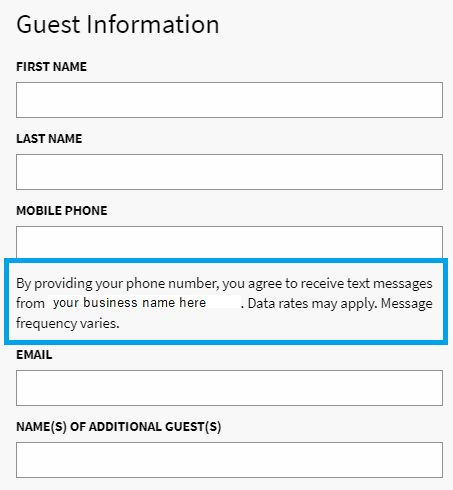Texting is a wonderful way to communicate with your guests, and many guests prefer to be texted than called or emailed for important information about their stay. Beyond the pertinent booking info, you can ask about food allergies, announce cocktail time or fresh cookies, remind guests about breakfast time, really, whatever information you feel is important for a guest to know about their booking or stay. A texting service also allows the guest to easily reach you - a great way to stave off possible bad reviews by dealing with issues as they occur rather than hearing about them after it's too late to fix anything.
An important part of texting your guests is using a legitimate texting service. Just as you wouldn't use your gmail account to send e-newsletters, you don't want to use your basic cell service to text your guests. Using such a verified company will better ensure that you aren't violating any rules and guidelines, and make it more likely that your texts get through to the guests.
The majority of our clients use ThinkReservations, so we are using information about ThinkMessenger for this article, kindly provided by Think's Director of Customer Success, Sean Rolson. Many texting services exist, though, and whoever you use should be following the same procedures, as they are standard in the industry.
First, we had a lot of client questions/concern about an email from Think requesting business information from clients using ThinkMessenger. The reason for that request was to register each business' brand and campaign for A2P (app to person) compliance. This prevents your texts from being marked as spam by the wireless carriers (Verizon, AT&T, etc.), and makes it far more likely that your guests will receive your communications, especially those with links included. The registry requires all of the information that was requested by Think to get your business registered.
Next, we wanted to discuss opt-in and opt-out. Similar to email campaigns, texting customers has rules imposed by various governmental bodies. Some services send a text requesting an opt-in. Since messages via ThinkMessenger all have to do with a booking and stay, they have chosen to add a disclaimer just under the mobile number field in the reservation that lets the user know that by providing their mobile number, they are agreeing to receive text messages from the property, along with language about data rates and message frequency.
Think recommends that your first text to the guest informs them that they can opt-out of text messages by simply replying with the keyword STOP, that they can re-start texting with START and get help with the keywords by replying HELP. This is also fairly standard in the A2P texting world. Sean has written an informative article with more texting best practices and information about A2P.
Texting guests outside of the reservation and stay window can get a bit sticky. If your brand (your business) and your campaign (the purpose of your texts) is registered to communicate with a guest regarding their stay, but the business reaches out to the guest with promotional texts (for example, offering a discount for an anniversary booking), it could be outside the campaign boundaries. The purpose of registration is so that "Brands, CSPs, and messaging content are all known upfront, meaning both the “Who” and the “What” of a campaign are traceable. The ability to tie all of this information together benefits the entire messaging ecosystem." Make sure you obtain consent (opt-in) before you send any promotional texts.
Texting is a great way to communicate with your guests before they get to your property, during their stay, and to followup afterwards. Using a texting service that has registered your brand and campaign is imperative for a smooth experience for both you and your guests.

